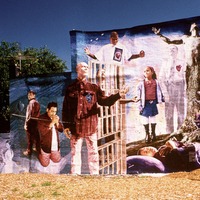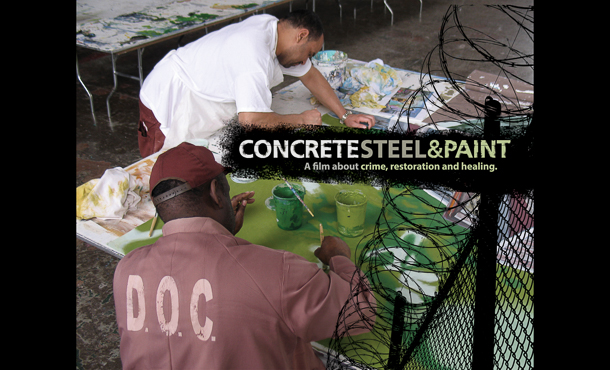The 2009 documentary “Concrete Steel & Paint,” a film produced and directed by Cindy Burstein and Tony Heriza, chronicles the discussions, dialogue, conflict and art of men and women – victims and offenders alike – involved in the Mural Arts Restorative Justice Program at the Pennsylvania State Correctional Institution at Graterford.
Putting victims and offenders together would seemingly spark conflict: “I have a real strong reaction to asking your victim to forgive,” one angry woman tells a group of incarcerated men, “because I think you have no right on the face of this earth to ever ask the person you’ve harmed to forgive you.”
But the opportunity also recognizes the desires of the offender to be restored to the community: “I don’t want my legacy to be just a murderer,” says one inmate. “I do have something to contribute.”

Eastern Mennonite University Lancaster’s Restorative Justice in Education program joins the Center for Community Peacemaking (CCP) to host a June 9 showing of the film at 7 p.m. at the Zoetropolis Art House and Theatre in Lancaster, Pennsylvania. Small group discussions and a panel presentation of restorative justice (RJ) experts, including Lorraine Stutzman Amstutz, will follow the film. Amstutz is RJ coordinator for Mennonite Central Committee and author of “The Little Book of Restorative Discipline for Schools.”
“This film is an excellent introduction to the principles of restorative justice, which started with victim-offender conferencing in prisons and correctional institutions several decades ago, and have been adapted and practiced in a growing number of school districts across the United States,” said Pam Rutt, assistant director of the MA in education program at EMU Lancaster. “We are pleased at the opportunity to join CCP in discussing this film and restorative justice practices with teachers and other community stakeholders.”
CCP Executive Director Christopher Fitz commented that the film contributes to “a deeper understanding of the complex challenges involved with both victims and offenders of violent crime. I hope it also inspires people to consider how they could be part of potentially healing responses to deep wounds in our community.”
Both EMU and CCP employ and educate practitioners of restorative justice. CCP works to build a culture of peace in the Lancaster area through a variety of strategies, some of which can be viewed in the documentary. The organization facilitates victim-offender conferencing, youth-parent communication courses, peacemaking circles to address conflict, and accountability circles for former offenders.
In 2014, EMU became the first graduate school in the country with restorative justice programs housed within a graduate education program. One semester later, in January 2015, the program was started at EMU Lancaster.
“Restorative justice in the classroom looks at a holistic approach which includes not only the rules that have been broken, but the relationships that have been harmed and the underlying causes for misbehavior that may be linked to academic failures,” said Assistant Professor of Education Katherine Evans, who led the development of the program at EMU. “It also looks at ways to create a safe classroom climate where students can own and understand their own needs and ask for the academic, emotional or social help that they need.”
The concept is being practiced with success in Los Angeles Unified School District, Oakland area schools, and in other districts across the country. In January 2014, the practices were endorsed by the U.S. Department of Education in a report, Guiding Principles: A Resource Guide for Improving School Climate and Discipline.
The restorative justice in education (RJE) coursework has been developed in conjunction with EMU’s Center for Justice and Peacebuilding, the academic home of the renowned pioneer in the field of restorative justice, Howard Zehr. (Zehr, in fact, reviews “Concrete Steel & Paint” as “a great discussion tool for college classes, community groups and others interested in issues of justice, conflict resolution and socially engaged art.”)
The education department also offers a 15-hour graduate certificate in RJE for students who have already earned a master’s degree or are not currently pursuing a master’s degree.
The goal is to make the RJE programs broadly accessible, according to Rutt. Courses are offered in a variety of formats, including online, blended, and on-site with weekends or week-long intensive summer courses.
